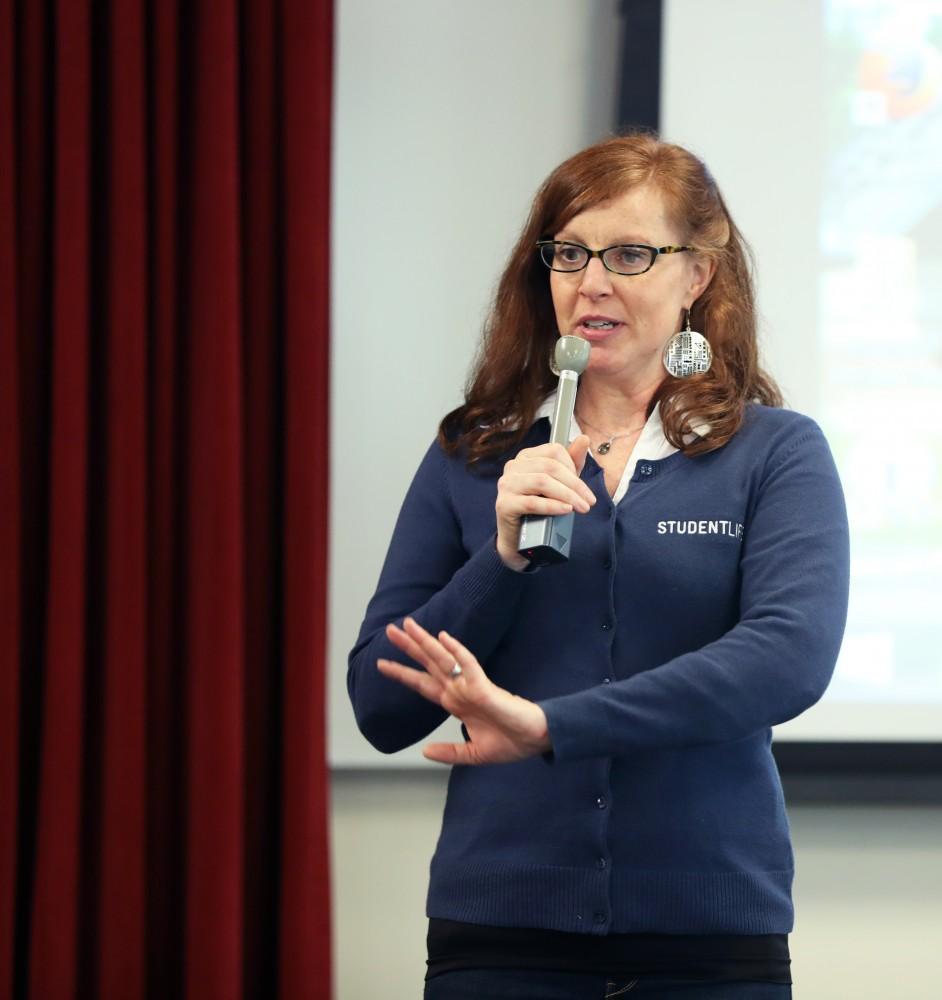“The Role of Media in a Democracy”

GVL/Kevin Sielaff – Melissa Baker-Boosamra introduces keynote speaker Professor Louis Moore during the Democracy: 101 event on Wednesday, Feb. 22, 2017.
Mar 2, 2017
In continuation of its Democracy 101 series, the Grand Valley State University Community Service Learning Center hosted a panel event to examine “The Role of Media in a Democracy” Wednesday, March 1, in the Kirkhof Center Pere Marquette Room.
During the event, the panelists discussed the process of verifying news sources and identifying “fake news,” the function of social media in modern reporting and current challenges facing journalism. The panel discussion was moderated by Melissa Baker-Boosamra, associate director of student life, civic engagement and assessment.
To kick off the discussion, audience members were polled to determine their go-to news sources and their definitions of fake news.
Of the polled audience members, four said they got most of their news from traditionally right-leaning outlets, four said they got their news from traditionally left-leaning outlets, 15 said they got their news from social media and 10 said they got their news somewhere else altogether.
“I get a ton of my news on social media,” said Elizabeth Psyck, a government documents librarian for university libraries at GVSU. “I actually think this is great. It allows us as individuals to interact with people who are writing the news.”
Katie Gordon, coordinator of Campus Interfaith Resources and the program manager for the Kaufman Interfaith Institute, identified potential hazards of relying on social media for news.
“While I also use social media significantly to consume and get my news, there are a lot of dangers that come with this,” Gordon said. “One thing is that especially our Facebook newsfeed can become echo chambers for people that we agree with. Sometimes social media leads to more reactionary or shallow analyses of what’s going on in the news.”
Audience members were also polled to ascertain how they defined fake news. Of the polled audience members, one said they defined fake news as politically biased news, 30 defined fake news as factually untrue information, zero defined fake news as news with which they did not agree and two defined fake news using a different definition altogether.
Len O’Kelly, assistant professor of multimedia journalism at GVSU, thanked the audience for not defining fake news as information with which they did not agree but said this was a big problem nonetheless.
“The ‘fake’ label is being hung on anything we don’t agree with now by some people who just want to hear what they want,” O’Kelly said. “If we’re going to use the term fake news, I also include those things that are put in there to distract us from what we should be talking about.”
Before segueing into a brief Q&A session, Baker-Boosamra asked the panelists what they considered to be some of the challenges facing journalism today.
“Money,” O’Kelly said. “Money’s the big one. (We) have started to consume more and more media and pay less and less for it. That resorts us to being very advertising-driven. (We) just, I think, in general need to be better about paying for what we consume if we want better quality.”
For more information about upcoming Democracy 101 events, visit www.gvsu.edu/service/democracy.

























